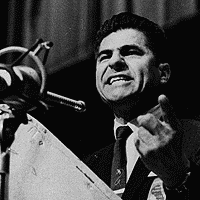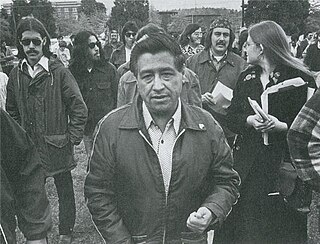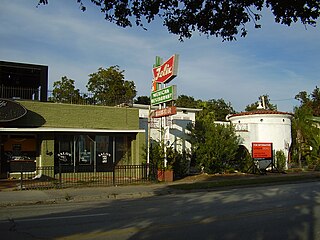Notes and references
Notes
Related Research Articles

Tex-Mex cuisine is an American regional cuisine that derives from the culinary creations of the Tejano people of Texas. It has spread from border states such as Texas and others in the Southwestern United States to the rest of the country as well as Canada. Tex-Mex is most popular in Texas and neighboring areas, especially nearby states in both the US and Mexico. It is a subtype of Southwestern cuisine found in the American Southwest.

Tejanos are the Hispanic residents of the state of Texas who are culturally descended from the original Spanish-speaking settlers of Tejas, Coahuila, and other northern Mexican states. They may be variously of Criollo Spaniard or Mestizo origin.

Reies Lopez Tijerina, was an activist who led a struggle in the 1960s and 1970s to restore New Mexican land grants to the descendants of their Spanish colonial and Mexican owners.2 As a vocal spokesman for the rights of Hispanos and Mexican Americans, he became a major figure of the early Chicano Movement and founded the Alianza Federal de Mercedes. As an activist, he worked in community education and organization, media relations, and land reclamations. He became famous and infamous internationally for his 1967 armed raid on the Tierra Amarilla courthouse.

Héctor Pérez García was a Mexican American physician, surgeon, World War II veteran, civil rights advocate, and founder of the American G.I. Forum. As a result of the national prominence he earned through his work on behalf of Hispanic Americans, he was instrumental in the appointment of Vicente T. Ximenes, a Mexican American and American G.I. Forum charter member, to the Equal Employment Opportunity Commission in 1966.

The Chicano Movement, also referred to as El Movimiento, was a social and political movement inspired by prior acts of resistance among people of Mexican descent, especially of Pachucos in the 1940s and 1950s, and the Black Power movement, that worked to embrace a Chicano/a identity and worldview that combated structural racism, encouraged cultural revitalization, and achieved community empowerment by rejecting assimilation. Prior to the Movement, Chicano/a was a classist term of derision, reclaimed only by some Pachucos who adopted it as an expression of defiance to Anglo-American society. As a result of the Movement, Chicanismo arose and Chicano/a was widely reclaimed in the 1960s and 1970s to express political autonomy, ethnic and cultural solidarity, and pride in being of Indigenous descent, diverging from the assimilationist Mexican-American identity.
The American G.I. Forum (AGIF) is a Congressionally chartered Hispanic veterans and civil rights organization founded in 1948. Its motto is "Education is Our Freedom and Freedom should be Everybody's Business". AGIF operates chapters throughout the United States, with a focus on veterans' issues, education, and civil rights. Its two largest national programs are the San Antonio-based Veterans Outreach Program, and the Dallas-based Service, Employment, Redevelopment-Jobs for Progress, Inc. (SER). The current National Commander is Lawrence G. Romo.
Gustavo "Gus" C. Garcia was an American civil rights attorney. Garcia worked with fellow attorney Carlos Cadena in the landmark case Hernández v. Texas (1954), arguing before the US Supreme Court for the end of a practice of systematic exclusion of Hispanics from jury service in Jackson County, Texas. Even though Mexican-Americans composed more than 10% of the county's population, no person of Mexican ancestry had served on a jury there and in 70 other Texas counties in over 25 years. The high court, led by Chief Justice Earl Warren, ruled that United States citizens could not be excluded from jury duty based on national origin, because such exclusion denied the accused a jury of his peers.

The League of United Latin American Citizens (LULAC) is the largest and oldest Hispanic Organization in the United States. It was established on February 17, 1929, in Corpus Christi, Texas, largely by Hispanic veterans of World War I who sought to end ethnic discrimination against Latinos in the United States. The goal of LULAC, or the League of United Latin American Citizens is to advance the economic condition, educational attainment, the political influence, housing, health, and civil rights of Hispanic people who are United States citizens. LULAC uses nationwide councils and group community organizations to achieve all these goals. LULAC has about 132,000 members in the United States and Puerto Rico.
The Little School of the 400 was a program in Texas to teach Spanish-speaking children 400 English words before they entered kindergarten during the late 1950s.

Felix Tijerina (1905–1965) was a Mexican-American restaurateur, activist, and philanthropist in Houston, Texas.
Mario Guerra Obledo was an American civil rights leader. He was called the "Godfather of the Latino Movement" in the United States, credited with establishing numerous civic institutions and bringing Latino interests into the center of the U.S. political arena. He also served as California's Secretary of Health and Welfare from 1975 to 1982.

The city of Houston has significant populations of Mexican Americans, Mexican immigrants, and Mexican citizen expatriates. Houston residents of Mexican origin make up the oldest Hispanic ethnic group in Houston, and Jessi Elana Aaron and José Esteban Hernández, authors of "Quantitative evidence for contact-induced accommodation: Shifts in /s/ reduction patterns in Salvadoran Spanish in Houston," referring to another large Latino group in Houston, stated that as of 2007 it was the most "well-established" Hispanophone ethnic group there. Houston is the third city for Mexican immigrants after Chicago and Los Angeles.

Tex-Mex cuisine is very popular in Houston. Many Mexican cuisine restaurants in Houston have aspects that originate from Texas culture. Katharine Shilcutt of the Houston Press said in 2012 that "Tex-Mex has been a vital part of our city for more than 100 years" and that it "never waned in that century." She added that "[t]he cultural significance of Tex-Mex as a vital touchstone between generations and an expression of our roots cannot be denied."
This is a Mexican American bibliography. This list consists of books, and journal articles, about Mexican Americans, Chicanos, and their history and culture. The list includes works of literature whose subject matter is significantly about Mexican Americans and the Chicano/a experience. This list does not include works by Mexican American writers which do not address the topic, such as science texts by Mexican American writers.
The Church in the Barrio: Mexican American Ethno-Catholicism in Houston is a 2006 book by Roberto R. Treviño, published by the University of North Carolina Press. The work covers the years 1911-1972 and discusses the relationship between the Mexican-American community and the Catholic church, and the "ethno-Catholicism" among Houston's Mexicans. This ethno-Catholism consisted of the cultural interaction between Irish American priests, religious practices of the indigenous Mexicans, and Mexican customs.
Ethnicity in the Sunbelt: A History of Mexican Americans in Houston is a 1989 book written by Arnoldo De León and published by the Mexican American Studies Program, University of Houston.
Brown, Not White: School Integration and the Chicano Movement in Houston is a 2005 book by Guadalupe San Miguel, Jr., published by the Texas A&M University Press. Brown, Not White discusses Chicano activism in Houston, Texas during the 20th century.
The following is a timeline of Latino civil rights in the United States.
Adela Sloss-Vento was born Karnes City, Texas to Anselma Garza and David Henry Sloss. As a young American woman of Mexican descent, she was determined to become a writer, hailing from southern Texas, educated in San Juan, later lived in Corpus Christi during World War II, and then settled in Edinburg, she used her pen as weapon for more than sixty years, countering racial discrimination and exploitation of laborers, all the while championing the civil rights of Mexican Americans through the written word.
Dale Baum is an American historian and long time professor at Texas A&M University. He researches the political history of the American Civil War and Reconstruction era, Texas history, and quantitative research of historiography. Baum has authored 3 books, The Civil War Party System (1984), The Shattering of Texas Unionism (1998), and Counterfeit Justice (2009).
References
- Carlson, Paul H. (2001-12-01). "Mexican American Odyssey: Felix Tijerina, Entrepreneur and Civic Leader, 1905-1965 (book review)". The Business History Review . 75 (4): 853–855. doi:10.2307/3116527. JSTOR 3116527.
- Christian, Garna L. (2003-02-01). "Mexican American Odyssey: Felix Tijerina, Entrepreneur and Civic Leader, 1905-1965 (book review)". The Journal of Southern History . 69 (1): 219–220. doi:10.2307/30039908. JSTOR 30039908.
- García, Mario T. (2003-03-01). "Mexican American Odyssey: Felix Tijerina, Entrepreneur and Civic Leader, 1905-1965 (book review)". The Journal of American History . 89 (4): 1568–1569. doi:10.2307/3092639. JSTOR 3092639.
- Kelley, Mary (2003-10-01). "Mexican American Odyssey: Felix Tijerina, Entrepreneur and Civil Leader, 1905-1965 (Book Review)". The Southwestern Historical Quarterly. 107 (2): 345–346. JSTOR 30242187.
- Marin, Christine (2002-04-01). "Mexican American Odyssey: Felix Tijerina, Entrepreneur and Civic Leader, 1905-1965 (book review)". The Western Historical Quarterly . 33 (1): 81–82. doi:10.2307/4144737. JSTOR 4144737.